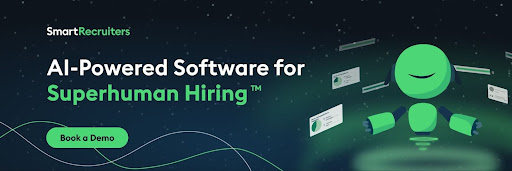With high turnover and comparatively low pay, talent acquisition processes for retail hourly workers have often historically been less sophisticated than for tech employees and other knowledge industry workers. They needn’t be. Best-practice retail employers are using advanced technologies that are making their hiring as effective as that of any industry. The growth of AI will give them an even more data-driven and efficient approach to retail recruiting.
It will make retail hiring Superhuman: efficient, effective, better for the candidate, and better for the hiring team. In this article, we’ll cover:
- The retail jobs landscape
- Practical solutions to retail talent challenges
- Examples of Superhuman Hiring in retail
- AI-driven technology to supercharge retail recruiting
The retail jobs landscape
The retail job market is strong. Outplacement firm Challenger, Gray & Christmas said that the end of 2024 was the “largest December retail hiring spree since 2014.” Their data shows that 2024 late-season demand added 148,400 retail positions.
Business challenges in retail
Retail’s hiring challenges are similar to the challenges of other sectors – and then some. Retail has the added challenge of worrying about being understaffed for seasonal needs, or overstaffed and driving up costs. Turnover can run 60% – or even 100% in the highest-turnover companies. Retail has also traditionally been underserved by technology providers. Recruiting tech providers with special expertise and features in high-volume hiring have been able to fill the void.
Decentralized hiring
Many high-volume retailers have decentralized hiring processes, where managers do most of the interviewing, sifting through stacks of applications (sometimes still using paper), and handling other hiring work. In these stores, some of the hiring processes common in other industries are little used in retail.
Career mobility and employer affinity
For its landmark Recruiting Benchmarks 2025 Report, SmartRecruiters examined 89 million applications for 1.5 million jobs across 95 countries. It found that only 2% of retail employees were hired through employee referrals, and only 3% were internal hires.
Retail recruiters have a great opportunity for recruiters to “sell” good career paths, said Susan Collins, a former talent-acquisition leader at Talbots and one of the leading experts in retail recruiting. Collins, who runs a 21,000-person community for retail professionals, said, “I don’t see where else you can be 22 years old and cut your chops leading a team of 10 or 20 people. It’s time to start thinking of retail differently, as a real path.”
Practical solutions to retail talent challenges
As we said at the outset, leading employers are using technology to improve their retail hiring, and finding success. Here is some of what’s working:
Identifying retail hiring bottlenecks
National Retail Foundation Executive Director Adam Lukoskie is seeing his members use AI for assessments, scheduling, background checking, and more. One of the most effective AI uses he is seeing is when companies identify where candidates are falling out of the funnel, and why. Instead of just assuming that a given city is a difficult market for hiring, companies are able to see if there is a store manager that is not acting fast enough, or whether there is a branding issue and the top-of-the-funnel talent attraction is lacking.
More sophisticated marketing and advertising for retail roles
Collins said retailers are finally building out “personas” in their recruitment marketing. Instead of one-size-fits-all messages, they’re breaking down what their potential managers, customer-service employees, regional managers, and other employees want in a job and career. Then they are developing separate advertisements for each persona. Traditionally reluctant to have videos taken in stores, they are having employees make videos about their work to spread on social media. “People want to see the real people doing the job,” Collins said.
Automating manual tasks for retail managers
Frasers Group, a UK-based retailer with 1,500 stores, upgraded its core recruitment software using SmartRecruiters, making life easier for managers, who typically hire 100 retail associates over a two-to-three-day period. “It was a game changer to have templated job profiles, automated messages in our branding and tone of voice, and calendar integration,” said Adam Reynolds, head of talent at Frasers Group. At recruitment events, recruiters can now take a picture of a CV, and the candidate’s information is immediately populated into SmartRecruiters.
Better experiences for retail candidates
High-volume hiring means a lot of people can and will spread the word about their application experience, something that can be very good or very bad for retailers. In retail, candidates are often the customer, so the candidate’s experience can affect company sales. The most astute retailers are making sure that candidates know where they are in the hiring process at all times. These companies are only adding additional interviews and assessments when their recruitment analytics show that those extra steps produce better hires. “If you don’t treat the candidates properly, they will tell everyone, and then it will be harder to hire,” said Camilla Ölander, Employer Branding Manager at JYSK, a 30,000-employee home furnishing retailer in 22 countries.
Streamlining retail hiring processes
As Reynolds, from Frasers Group, said, “You will live or die by the speed you can hire.” Drop-off rates can be enormous, with the Society for Human Resource Management saying that up to 92% of people who start a job application don’t finish it. Even after they apply, they’re prone to drop out; by implementing automated, templated communications, Frasers reduced candidate drop-off by 25%.
Better interview questions for retail roles
Some retail managers ask interview questions that have little to do with a person’s success on the job. Interview questions should only be job-related. AI is increasingly being used to generate interview questions that fit the skills required in each retail job. For example, SmartRecruiters’ AI co-pilots suggest interview questions that users can populate into hiring scorecards, offering a more objective view of each candidate.
Examples of Superhuman Hiring in retail
Here are some of the ways best-practice retailers are already seeing results from their modernization efforts.
-
JYSK processes 50,000 applications monthly, and reduced hiring time by 64% with the introduction of automated workflows that empower hiring managers to take charge of their own recruiting.
-
Frasers Group processes more than a million applications a year for 20,000 roles. With AI, automated workflows, templated communications, and a culture of continuous improvement, Frasers reduced the time to hire to nine days, reduced first-month new hire churn by 25%, and needed 50% fewer ads.
These examples are just the beginning of how AI is going to help retail talent acquisition.
Susan Collins, the retail community leader, recently learned of an applicant for a retail role who was turned down because their resume didn’t match the keywords the ATS was looking for. She called the TA leader at the retailer and told them that the applicant appeared to be highly qualified. The TA leader agreed, and the person was hired.
AI tools like Winston from SmartRecruiters and others that SmartRecruiters is rolling out will reduce these sorts of snafus.
“If AI is done right, it’s going to really help weed through resumes,” said Collins.
AI-driven technology to supercharge retail recruiting
Matching, scheduling, and screening
Winston’s matching capabilities will supercharge candidate discovery from an average of 65 applicants per role. AI will also increasingly handle interview scheduling, screening, and matching. Retail managers will spend much less time sifting through applications for candidates who don’t fit the open role and potentially interviewing unqualified candidates. Applying for retail jobs will be easier for recruiters, managers, and candidates.
Next-generation recruitment chatbots
Chatbots using conversational AI will help candidates get answers to their questions on any device through sophisticated, user-friendly tools instead of awkward chatbots that provide limited answers to a limited range of questions. Candidates will be able to ask questions about scheduling flexibility, locations, pay, promotion opportunities, and more. They will also receive useful answers with links to videos and other materials providing more information. Providing candidates with relevant information ahead of time will help them self-select and ultimately speed up recruiting. Just as importantly, it will free up managers’ time to facilitate business in their stores.
Talent rediscovery
AI will improve talent rediscovery for companies to find past applicants and surface them for newly opened jobs. “Databases are rich with people,” Collins said. “A good leader knows how to go back and find those people again.” In the future, an AI agent could automatically conduct a database search the moment a position opens.
Frasers Group already leverages CRM capabilities to supercharge their teams: In the second year with SmartRecruiters, the retailer made 40% of its hires through SmartCRM.
Superhuman Hiring can begin today
Retail leaders need to prepare now for the competitive advantage AI will provide. Get in touch today to learn more about how SmartRecruiters can make Superhuman Hiring possible in your stores.






